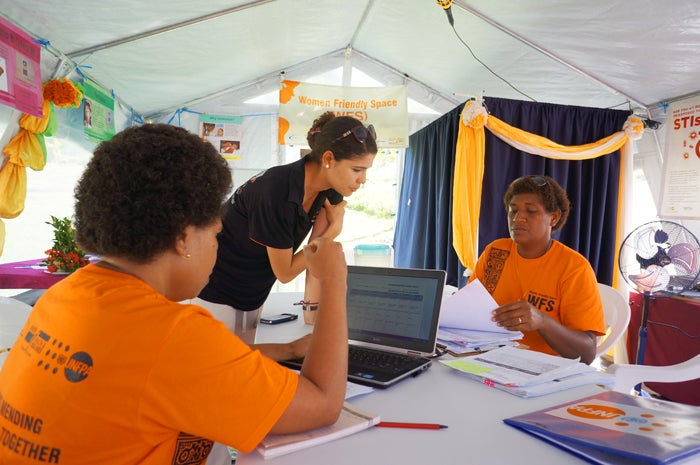IT was the warm engaging smile which invited us into the house of which Emali Racele was the centerpiece, just completing the final weaving cycle of a Fijian fan.
"No, I used to be a cook," she said when asked if weaving had been part of her whole life. "But I would watch women who did this full-time. That's how I learnt, I just watched them and followed."
It is however not just about her being a self-taught weaver. Ms Racele enjoys the entrepreneurial aspect of this traditional knowledge, relating with her infectious smile how she would reach towns three to five hours away from her village in Ba.
Ms Racele was sitting in a women resource centre, a programming initiative supported by the United Nations Population Fund (UNFPA) Pacific subregional office (PSRO) with the Ministry for Women, Children and Poverty Alleviation (MoWCPA).
"Having a centre like this supports us very much. Now I don't have to go pay for a table at the market so I have space as well where I can continue weaving while waiting for customers. Here, people stop and buy out stuff," Ms Racele said.
"We also have a lot of space to teach the younger women in the village who may be interested in learning. It is also a good place to just be together as women of the village and talk."
Like the women resource centres, the UNFPA also introduced the concept of women-friendly spaces as part of its contribution to the Severe Tropical Cyclone Winston response, working with line ministries (the MoWCPA and the Ministry of Health and Medical Services), and non-government organisations which offer specialist services.
So far, some 700 women and girls have recorded their attendance of information sessions in the eight women-friendly spaces in the worst-hit areas. For two or more hours every day, information sessions are organised for women and girls through MoWCPA. This activity has seen representatives from government ministries, from the Legal Aid Commission, etc to discuss available help to the general public.
Apart from information services, the women-friendly spaces has also been a place where women can gather to share their various experiences, in safety and confidence.
Each women-friendly space also has a midwife (engaged through the Ministry of Health and Medical Services) for clinical advisories particularly regarding sexual and reproductive health information and services, and counsellors (engaged through Empower Pacific). The Government of Australia supports the three women-friendly spaces located in Ba.
Ms Racele, 66, who is originally from Dalomo Village in the Yasawa Group of Islands in the Western Division, continues to earn cash for herself and her family, apart from enjoying what she does which includes the production of quaint little handbags with tapa covering or woven coin purses.
Ms Racele's story is just one of many in our Pacific Island communities. A study of markets in the region a few years ago confirmed what we saw every day, the majority of market vendors are women. Some Pacific Island nations have followed up recommendations of the study for example the provision of rest rooms which ensured women vendors some privacy.
It is in providing simple but fundamental services like toilets for women which contribute to an enabling environment, particularly initiatives which address the roots of gender inequality, which then ensures women such as Ms Racele both the space and the drive to realise entrepreneurial dreams.
Economic empowerment is seen as one of the key areas that has to be enhanced to ensure both girls and women are able to live their basic human rights, choosing their pathways and thus owning the aspirations of the sustainable development goals (SDGs).
It is also one of the main topics on the agenda of the fourth global conference of Women Deliver which ended yesterday (May 19, 2016).
The conference which is supported by the UNFPA also covered this week issues around health, in particular maternal, sexual, and reproductive health and rights, and the inter-connections with gender equality, education, environment, and economic empowerment.
Touted the largest gathering on girls' and women's health, rights and wellbeing in more than a decade, and one of the first major global conferences following the launch of the SDGs, a critical outcome of the meeting is the formulation of steps on how to implement the SDGs as they relate to girls and women.
The 2016 conference has again brought together world leaders, advocates, policy makers, journalists, young people, researchers and leaders of the private sector and civil society to showcase what it means and how it works when women and girls become the focus of development efforts.
"As a major partner of the conference, UNFPA calls on all countries to protect and fulfil sexual and reproductive health and rights by ensuring that every woman can exercise her right to contraception, safe birth and dignity," Dr Laurent Zessler, UNFPA director and representative said.
"When women have choices, it changes the world for the better."
The conference hopes to come up with a road map to full realisation of the SDGs, through the girls' or women's lenses.
Each of us will then have the responsibility to create women-friendly spaces, from an individual, national and global level: a women-friendly global community which recognizes that empowering girls and women will be key to getting an "on track" report card of SDGs indicators.



